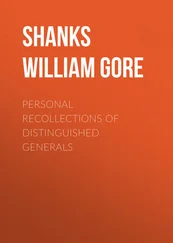
Above are a selection of sketches of Trent Park produced by the prisoner Lieutenant Klaus Hubbuch in autumn 1943
The German prisoners were lodged in the second floor of the mansion. Generals occupied two rooms, a Generalleutnant would have his own suite, ranks below this shared two to a room. Sources indicate that the prisoners were ‘very satisfied’ with the accommodation.
Besides a bed, cupboard, commode, table and chair, each room has a comfortable sofa. This sofa and the hot running water are things which make captivity considerably more pleasant. Bassenge, a do-it-yourself enthusiast, was kind enough to make me a reading lamp which he hung over my bed. All rooms are decorated with pages from a German art calendar stapled to the walls, [48] Menny, BA/MA N267/4.
Erwin Menny noted in his diary. There was a common area equipped with radio, reading room, a study for painting and music and a dining room. On the first floor was a hall in which table-tennis and billiards were possible. ‘Unfortunately there is no tennis court’ General Cramer wrote in a report to relatives of prisoners at Trent Park on 8 June 1944. All the windows were barred but the prisoners had freedom to be in the open in the courtyard on the south side and on a 120 x 70-metre lawn on the west and north side of the mansion. These areas were surrounded by barbed wire fencing. The generals noted with pleasure that the British guards patrolling between the two barbed wire fences saluted them smartly. Oberst Lex noted in his diary: ‘These guards were always very well disciplined and would greet you, e.g. at Christmas and New Year with “Merry Christmas, Sir, a Happy New Year, Sir.” We really enjoyed the guard change at 0900 each morning which was carried out in the presence of an officer with typical British stiffness and pedantry. It was militarism in purity’ (Franz Lex, diary, p. 19). Four days per week the prisoners were accompanied by a British officer on a ramble through woods and fields on the estate, which they quickly christened ‘Little Hyde Park’. Oberst Hans Reimann ran a small shop selling smoker’s requirements, beer, writing utensils, soap and other minor necessities. The prisoners received their monthly pay in pounds sterling equivalent and used it to buy personal items in modest quantities. Laundry and matters pertaining to dress were attended to by a London tailor who visited the camp fortnightly. Small everyday items not sold by the shop such as mirrors, cigar snippers, pipes and books would be obtained on request by Lord Aberfeldy on his weekly trip to London. This service increased the prisoners’ trust in him. [49] For a forthright description of Trent Park see Ramcke, ‘Fallschirmjäger’, pp. 79–82 and Heydte, ‘Muss ich sterben, will ich fallen’, p. 185. Erwin Menny remarked in his diaries that anything that could still be bought in England was incredibly expensive. This was because the British converted Wehrsold at a ludicrous rate of 1 pound sterling to 20 Reichsmark. BA/MA N267/4.
The catering at Trent Park was simple but ample, although of poorer quality than in the transit centres behind the front and at Latimer House, where the fare was highly praised but ‘to our German way of thinking too abundant’ as Erwin Menny observed. [50] Menny, BA/MA N267/4.
A precise daily routine was followed. Reveille was at 0800 [51] Ibid., and Crüwell Diary, Vol. 2, p. 3.
and the day ended 12 hours later with evening rounds. For entertainment and education, cards and board games were supplied and the very good library of the former German Embassy in London placed at their disposal. [52] Between November 1942 and January 1943, von Thoma read Clausewitz, ‘Vom Kriege’; Goethe, ‘Briefe’; Tirpitz, ‘Erinnerungen’; Langhoff, ‘Moorsoldaten’; Bismarck, ‘Gedanken und Erinnerungen’; Friedjung, ‘Zeitalter des Imperialismus’. Diary entries, 20.11 and 27.12.1942, 1.1, 11.1. and 17.1.1943. BA/MA N2/3.
Two British officers and prisoners Konteradmiral Meixner and Hennecke gave language tuition. Films were screened from time to time. [53] For example, ‘Desert Victory’ on 9.4.1943 which von Thoma considered well done and in no way offensive to the Germans. Crüwell thought the Germans would have made a better production of it, SRM 194, 9.4.1943, TNA WO 208/4136. At the end of November 1943 ‘The Gentle Sex’ and a propaganda report about the ‘National Kommittee Freies Deutschland’ was screened. GRGG 90, 3.–9.10.1943. This was followed in the week beginning 6.2.1944 by ‘A Christmas Carol’ and ‘God Save the King’, GRGG 118, TNA WO 208/4363.
The Geneva Convention allowed the prisoners to exchange correspondence regularly with relatives through the Swiss protecting power. The prisoners could send letters or postcards. These would take between two weeks and four months to arrive. Since they were censored, the old German script was not permitted. It was rare for any political or military information to be passed in them because the communications were read by the British and German controls. Georg Neuffer complained to his wife on 26 August 1943 that his letters ‘in the manner of things so lack content that they finish up always saying the same things’. Thus the generals wrote mainly about the camp’s lovely surroundings and their daily occupations. Only a few varied from this practice: on 10 July 1943 Generalleutnant Gotthard Franz wrote to his wife: ‘All will be well. The nation which produced Luther, Kant, Goethe and Beethoven, will never die’ (TNA, DEFE 1/339).
The longer the war went on, the worse the air raids on German cities became, the more did concern for the well-being of those at home tend to dominate the mails. Generalleutnant Friedrich von Broich wrote on 4 October 1944 to his wife: ‘We are now hanging around here, debarred from playing our parts as soldiers and husbands and you women have to suffer for it and experience the war in its most dreadful form. That is such a paradox. One can go off the deep end over it and can find no peace at nights on account of one’s thoughts’ (TNA, DEFE 1/339).
The British suspected generals Arnim, Crüwell and Hülsen, Konter-admiral Meixner and colonels Buhse and Wolters of passing military information to Germany by means of secret codes. It is certain that in a letter to his wife dated 15 July 1944 Konteradmiral Paul concealed a message in which he relayed his grave belief that ‘the enemy has all the codes’ (NA, RG 319, entry 745001, Box 10).
Trent Park offered many comforts which the generals sorely missed when they arrived at other camps in October 1945. [54] This applied very much to the camps in France, Belgium and to some extent Germany whence the generals were brought from the United States and Britain after 1945, although the situation deteriorated noticeably in British camps too. Thus von Thoma’s bitter complaint in November 1945 about the conditions at Grizedale Hall in Lancashire. Searle, ‘Wehrmacht Generals’, p. 298.
The contrast to the ghastly reality of the battlefields of Europe could scarcely have been greater: ‘Peace, beauty, life here – war, devastation, death [there]…’ The only reminders that a war was in progress at all were the German air raids on London in February and March 1944. [55] The attacks evoked astonishingly little reaction from the prisoners, as CSDIC (UK) remarked in GRGG 123, 20.–26.2.1944, TNA WO 208/4363.
From June 1944 to March 1945 the inmates had the opportunity to experience the V-weapons offensive on London. In January 1945 a V-1 flew over Trent Park and exploded two miles away. A V-2 hit only a mile away from the main camp buildings. ‘It was depressing to see the daily departure of the powerful bomber formations, which returned, from our number counts, with hardly their plumage ruffled,’ Franz Lex noted (Franz Lex, diary, p. 22). These were, however, the only ‘occurrences’ in the tranquil life at Trent Park. ‘It is as if we were living in a quite unreal world,’ Generalleutnant Ferdinand Heim wrote of the atmosphere at the centre:
Читать дальше
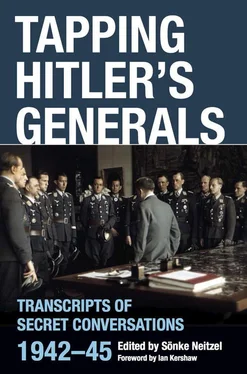


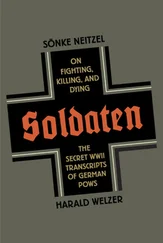
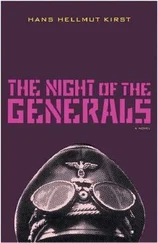


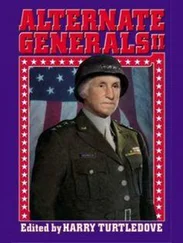

![Traudl Junge - Hitler's Last Secretary - A Firsthand Account of Life with Hitler [aka Until the Final Hour]](/books/416681/traudl-junge-hitler-s-last-secretary-a-firsthand-thumb.webp)



